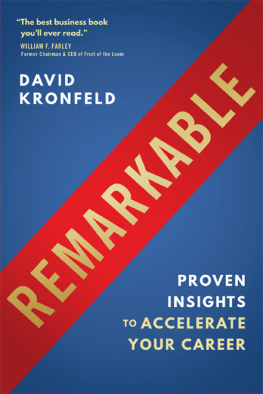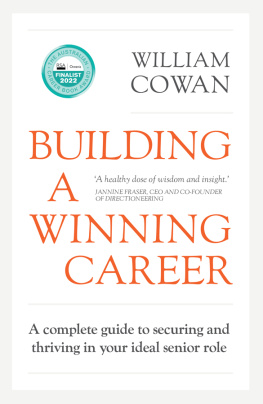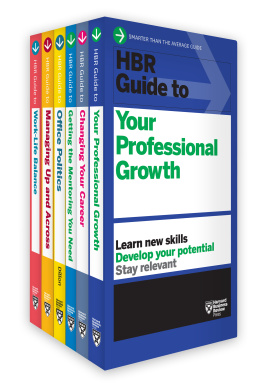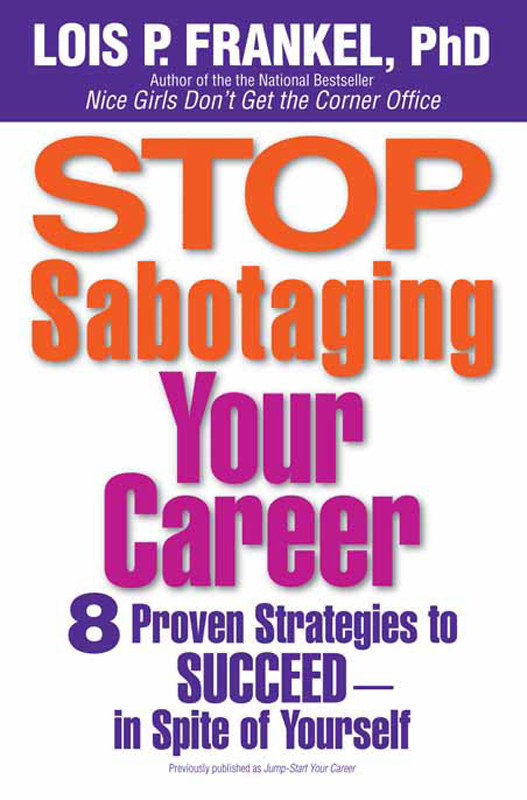Copyright 1998, 2007 by Lois P. Frankel
All rights reserved. Except as permitted under the U.S. Copyright Act of 1976, no part of this publication may be reproduced, distributed, or transmitted in any form or by any means, or stored in a database or retrieval system, without the prior written permission of the publisher.
Warner Business Books
Hachette Book Group
237 Park Avenue
New York, NY 10017
Visit our website at www.HachetteBookGroup.com.
The Warner Business Books name and logo are trademarks of Hachette Book Group, Inc.
First eBook Edition: April 2007
ISBN: 978-0-446-19478-5
A must-read for anyone who wants to make the future better than the pastand thats just about all of us.
Anne Fisher, Ask Annie columnist,Fortune Magazine

Dr. Frankel develops organizations by focusing on the fundamentals: effective personal performance by fully functioning people. Her critical insights and tools for shaping complete capability offer personal and organizational tool kits for people and their managers. Individual inefficiency and personal barriers to success are the frightening cost issues of twenty-first-century companies. Lois offers useful means to avoid those costs beginning now!
John Hofmeister, president, Shell Oil Company

A must-read for coaches working with corporate employees. Each chapter is a mini-workshop, and the authors generous use of client stories and coaching examples makes for an interesting read. This is the perfect gift for the client whos ready to get back on track.
Cheryl Richardson, founding president, International Coach Federation
Also by Lois P. Frankel, PhD
SEE JANE LEAD:
99 Ways for Women to Take Charge at Work
NICE GIRLS DONT GET RICH:
75 Avoidable Mistakes Women Make with Money
NICE GIRLS DONT GET THE CORNER OFFICE
101 Unconscious Mistakes Women Make That Sabotage Their Careers
KINDLING THE SPIRIT:
Acts of Kindness and Words of Courage for Women
WOMEN, ANGER AND DEPRESSION:
Strategies for Self-Empowerment
I once read, Entrance to anothers soul is a sacred honor. This book is dedicated to the men and women who, for more than two decades, have allowed me the privilege of entering their personal and professional lives, trusted me enough to make the leap of faith required to follow my coaching suggestions, and provided me with the opportunity to learn from them as much as I hope they learned from me.
Im delighted that Diana Baroni at Warner Books acquiesced to two years of my nagging by giving me the opportunity to update and re-release a book I wrote a number of years ago titled Overcoming Your Strengths: 8 Reasons Why Successful People Derail and How to Remain on Track (called Jump Start Your Career in the paperback version). One reason it was so important to me was that I wanted to respond to all the men who have asked me to write a book thats not exclusively for women so they can read it without embarrassment. But the primary reason I kept pursuing it was that the world and the workplace are so different than they were a decade ago. Back then, terrorism and natural disasters on an epic scale were things that happened in other countries, not ours. WorldCom and Enron were well respected companies with trusted leaders. The Apprentice was not a television show but rather someone who learned a trade under the tutelage of a more experienced crafts-person. And Martha Stewart was a domestic diva, not a convicted felon.
In the intervening decade, business has become increasingly competitive, and many workplace mores have fallen to the wayside. Work formerly done by Americans is now outsourced to foreign countries, and laws have been enacted that circumscribe and regulate corporate governance. A new generation of savvy, swift, and smart workers who bring a set of values and a work ethic far different from their predecessors is poised to take over where the baby boomers leave off. Worklife balance has become an increasingly hot topic of concern to workers of all ages. Yet some things havent changed. People who rise to the top arent always those with the highest IQs. They arent the people who work the hardest or make the biggest sacrifices for the sake of their careers. And they certainly arent the people who keep their noses to the grindstone with their mouths shut. Theyre the people who understand that nontechnical capability (often referred to as the soft skills) is every bit as importantif not more importantas technical capability when it comes to reaching their maximum career potential.
How, then, do some folks always seem to do and say the right thing, while others cant quite figure out what it takes to achieve and, more important, maintain successful careers? Regardless of career path or position, most of us have experienced that sinking feeling of being on the sidelines watching as less qualified colleagues get the choice assignments, promotions, or developmental opportunities that are intended to groom them for the next rung of the corporate ladder. We may grumble about the injustice of being overlooked for opportunities we feel we deserve, but rarely do we take the time to examine why this happens and what we can do to make ourselves more competitive.
Three decades as a human resource professional, management consultant, and executive coach working inside some of the largest and most respected organizations worldwide have given me the opportunity to learn firsthand why some people surpass their professional peers indefinitely while others spin their wheels in what are at times lucrative but dead-end jobs. One principal reason why companies bring in business coaches to work with executives is that they know even the most talented professionals can have Achilles heels or blind spots that preclude them from achieving their full potential. Savvy companies, like sports teams, turn good players into great ones through coaching. They understand that the cost of turnover is too high to let them fail. My access to the best and the brightest was as a consultant and business coach committed to helping organizations achieve extraordinary results through maximization of their human resources.
If youre reading this book, its likely that your profile resembles that of many of my clients: You are good at what you do, and may even be recognized for one or more particular strengths, but are somehow stalled and unknowingly sabotaging your best professional efforts. This phenomenon, whereby fast-trackers are displaced from successful career paths by over-relying on the skills that helped them achieve past success, is called derailment. Researchers from the Center for Creative Leadership in Greensboro, North Carolina, estimate that 30 to 50 percent of high-potential managers and executives derail. In my own practice, Ive found that such derailment occurs at every level of the workplace with just about the same frequency as it does among executivesand always for the same reasons. Thats why this book provides a broad context for understanding workplace behavior geared toward anyone at any professional level who wants to stop sabotaging his or her career and learn the essential strategies for becoming and staying competitive in the workplace.
I define derailment











